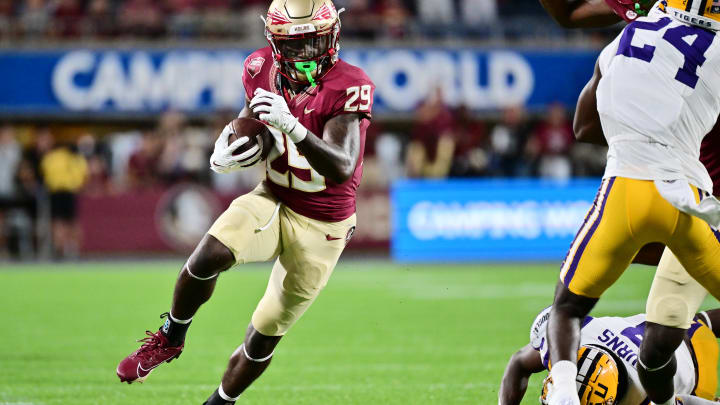
The 2024 season has been a whirlwind for former FSU football running back Rodney Hill, a player who was expected to be a key contributor in the Seminoles’ backfield. However, things took an unexpected turn when Hill entered the transfer portal on December 13th, leaving fans and analysts puzzled. While it was initially speculated that NIL (Name, Image, Likeness) issues were at the heart of his departure, the full story has only recently come to light.
Hill, a former three-star recruit, first committed to Florida A&M (FAMU) in Tallahassee after leaving FSU. However, his plans were disrupted when FAMU head coach Willie Simmons accepted a job at Duke. Hill then shifted his commitment to Miami, where he was set to play as a preferred walk-on. Yet, in April, he ultimately found a new home with the Arkansas Razorbacks.
In a candid interview following an Arkansas practice, Hill shared the details of his departure from FSU:
“Not many people know, but my parents were managing my finances and other affairs,” Hill revealed. “They got involved with a bad agent who started texting other schools, pretending to be me. When that information got back to the head coach, I had no choice but to leave Florida State. I didn’t want to leave, but the portal was closing, and I had to act quickly. FAMU was close by, so I went there for a month while I looked for a new place.”
Hill’s experience highlights the complexities of the modern college football landscape, where NIL deals and transfer portals can make or break a player’s career. Reflecting on the situation, Hill offered advice for other athletes:
“I know it’s your parents and they want what’s best for you, but sometimes you have to take control of your own affairs,” Hill said. “My parents were trying to do right by me, but this situation taught me that sometimes you have to handle things yourself. I’d tell other players that there’s no need to rush into getting an agent—just wait.”
The situation at FSU reportedly involved the agent making exorbitant NIL demands on Hill’s behalf, which seemed excessive for a player who was primarily a backup to Trey Benson. It’s now clear that these demands were driven by the agent, who was likely influencing Hill’s parents. Given that the agent impersonated Hill while negotiating with other schools, Hill may have grounds for legal action.

This episode sheds light on how NIL and the transfer portal have transformed college football. Fortunately for Hill, his talent has secured him a spot at another major program. However, many players who enter the portal are not so lucky—they fade from the spotlight and may never play football again, let alone earn a degree.
Hill’s decision to speak out is commendable, as it provides valuable lessons for young players navigating the complexities of college sports today. It will be interesting to see if Hill can make an impact in his third season of college football.

Leave a Reply